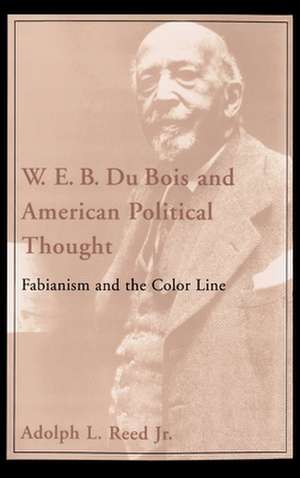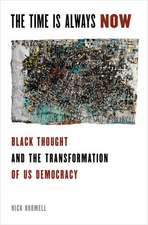W.E.B. DuBois and American Political Thought: Fabianism and the Color Line
Autor Adolph L. Reeden Limba Engleză Hardback – 11 dec 1997
| Toate formatele și edițiile | Preț | Express |
|---|---|---|
| Paperback (1) | 447.91 lei 31-37 zile | |
| Oxford University Press – 15 apr 1999 | 447.91 lei 31-37 zile | |
| Hardback (1) | 500.69 lei 31-37 zile | |
| Oxford University Press – 11 dec 1997 | 500.69 lei 31-37 zile |
Preț: 500.69 lei
Preț vechi: 715.40 lei
-30% Nou
Puncte Express: 751
Preț estimativ în valută:
95.81€ • 100.28$ • 79.74£
95.81€ • 100.28$ • 79.74£
Carte tipărită la comandă
Livrare economică 20-26 martie
Preluare comenzi: 021 569.72.76
Specificații
ISBN-13: 9780195051742
ISBN-10: 0195051742
Pagini: 296
Dimensiuni: 157 x 231 x 25 mm
Greutate: 0.61 kg
Editura: Oxford University Press
Colecția OUP USA
Locul publicării:New York, United States
ISBN-10: 0195051742
Pagini: 296
Dimensiuni: 157 x 231 x 25 mm
Greutate: 0.61 kg
Editura: Oxford University Press
Colecția OUP USA
Locul publicării:New York, United States
Recenzii
W. E. B. Du Bois is a towering figure of central importance in American political thought, and so he has been annexed to many positions alien to his own. Reed provides the most informed, insightful, and balanced account of Du Bois's thinking yet written, one that is profoundly illuminating for progressive thought and action on issues of racial, political, and economic equality today.
Adolph Reed's book is quite simply brilliant. It liberates Du Bois scholarship from a host of disfiguring anachronisms. By persuasively establishing the specific intellectual context within which Du Bois worked, Reed systematically reinterprets the meaning and significance of Du Bois's most influential writings. The logic is searing, the scholarship is impeccable, and, as always with Reed, there's a bristling polemical punchline as well. Anyone who takes Du Bois seriously must come to terms with this book.
An extremely important contribution. Not only does Reed critically reclaim Du Bois as part of the traditions of both African American and American political thought, but he also locates Du Bois's thought and work in the dynamic changes in the political economy and racial politics of late 19th and 20th century America. Reed's book will be discussed and argued about for years, both for its provocative account of Du Bois's lifework and for its capacity to inform not only contemporary political debate, but also contemporary political action.
Reed has never been a man to go with the cultural flow. At a time when too many intellectuals, both black and white, are trimming their views to the rightward and depoliticizing winds of current fashion, Reed offers a bracing defense of a radical alternative. Tough-minded and wide-ranging, this book is not merely a rigorous contextualization of Du Bois that, in challenging conventional contemporary appropriations of him, will have to be taken account of by all serious future Du Bois interpretation. It is also a stirring call for a renewed Afro-American politics and scholarship that does not pass off covert quietism as activism and racial vindicationism as analysis.
This controversial book offers more than a challenging and well- researched interpretation of the legacy of Du Bois. In its most explosive pages Reed measures present-day public intellectuals" against the standard set by Du Bois, and it is clear that he finds the current generation wanting. This book is certain to stimulate much probing discussion and considerable soul-searching..
Adolph Reed's book is quite simply brilliant. It liberates Du Bois scholarship from a host of disfiguring anachronisms. By persuasively establishing the specific intellectual context within which Du Bois worked, Reed systematically reinterprets the meaning and significance of Du Bois's most influential writings. The logic is searing, the scholarship is impeccable, and, as always with Reed, there's a bristling polemical punchline as well. Anyone who takes Du Bois seriously must come to terms with this book.
An extremely important contribution. Not only does Reed critically reclaim Du Bois as part of the traditions of both African American and American political thought, but he also locates Du Bois's thought and work in the dynamic changes in the political economy and racial politics of late 19th and 20th century America. Reed's book will be discussed and argued about for years, both for its provocative account of Du Bois's lifework and for its capacity to inform not only contemporary political debate, but also contemporary political action.
Reed has never been a man to go with the cultural flow. At a time when too many intellectuals, both black and white, are trimming their views to the rightward and depoliticizing winds of current fashion, Reed offers a bracing defense of a radical alternative. Tough-minded and wide-ranging, this book is not merely a rigorous contextualization of Du Bois that, in challenging conventional contemporary appropriations of him, will have to be taken account of by all serious future Du Bois interpretation. It is also a stirring call for a renewed Afro-American politics and scholarship that does not pass off covert quietism as activism and racial vindicationism as analysis.
This controversial book offers more than a challenging and well- researched interpretation of the legacy of Du Bois. In its most explosive pages Reed measures present-day public intellectuals" against the standard set by Du Bois, and it is clear that he finds the current generation wanting. This book is certain to stimulate much probing discussion and considerable soul-searching..
Notă biografică
Adolph L. Reed, Jr is Professor of African-American Studies and Political Science at the University of Illinois-Chicago. He is a regular columnist for The Village Voice and a frequent contributor to The Progressive and The Nation












